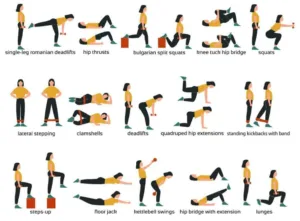Muscular endurance represents the ability of a muscle or group of muscles to endure repeated contractions against resistance for an extended duration. This aspect is pivotal for diverse physical activities and athletic endeavours. Enhancing muscular endurance entails participating in activities such as weight training, aiming for a minimum of 12 repetitions, emphasizing deliberate and unhurried movements, maintaining a consistent exercise regimen, pushing the body’s limits by progressively increasing weight, repetitions, or sets, and ensuring optimal movement mechanics. Muscular endurance training revolves around elongating the duration of muscle contraction during exercises by manipulating factors such as weight, sets, repetitions, and intervals of rest.
Why is muscular endurance important?
Muscular endurance holds significant importance for a variety of reasons, which include:
- Enhanced Athletic Performance: Muscular endurance contributes to improved athletic performance by enabling muscles to sustain repetitive motions over extended periods.
- Facilitation of Daily Activities: Strengthening muscular endurance simplifies daily tasks, such as lifting groceries or engaging in play with children, by reducing fatigue.
- Injury Prevention: Muscular endurance aids in injury prevention by enhancing stability, promoting better posture, and diminishing the likelihood of musculoskeletal injuries.
- Promotion of Health Benefits: Engaging in muscular endurance training yields numerous health advantages, such as enhanced blood circulation, reduced risk of cardiovascular ailments, and lower levels of triglycerides and blood sugar.
- Longevity and Health Promotion: Research indicates that boosting muscular endurance can positively influence overall health and lifespan, with benefits akin to those observed with aerobic training, underscoring its importance as a valuable intervention for long-term health.
To summarize, muscular endurance plays a vital role in everyday activities, injury avoidance, athletic performance enhancement, and overall health and longevity.
How to improve
To enhance muscle endurance, you can integrate a variety of exercises into your regimen. Below are some exercises endorsed by fitness professionals:

- Push-ups: Concentrating on the chest and arms, push-ups activate the endurance of upper-body muscles.
- V-Ups: This exercise targets the upper and lower abdominal muscles, back, and thighs, fostering muscle endurance.
- Planks: Renowned for core strengthening, planks also bolster endurance in the abdominals, back, glutes, and hamstrings.
- Calf Raises: Fortifying the gastrocnemius and soleus muscles, calf raises aid in developing strength and endurance in the lower legs.
- Bodyweight Squats: These squats engage the glutes and legs, enhancing endurance and strength in the lower body.
Integrating these exercises into your workout routine can contribute to improving muscle endurance across diverse muscle groups.
Which activity is a result of high muscular endurance?
Muscular endurance pertains to muscles’ capacity to endure exercise for prolonged periods. Engagements such as folding laundry, trekking up a mountain, or completing numerous repetitions of exercises like push-ups or squats exemplify robust muscle endurance. This endurance variety holds significant importance across a spectrum of physical activities, spanning from mundane chores to athletic pursuits, as it enables muscles to operate ceaselessly without succumbing to fatigue. Such endurance not only enhances overall health and fitness but also mitigates injury risks.
Benefits of Muscular endurance

Muscular stamina stands as a cornerstone of physical fitness, offering a plethora of benefits that enrich overall health and well-being. These advantages encompass various facets, each contributing to a holistic approach to fitness and vitality:
Elevated Athletic Performance
By honing muscle endurance, individuals can witness a marked enhancement in their performance across endurance-centric sports and activities, such as running marathons, engaging in rowing competitions, or embarking on lengthy cycling excursions. The ability to sustain prolonged exertion without succumbing to fatigue becomes a key asset in achieving peak athletic prowess.
Augmented Aerobic Capacity
Muscular endurance training fosters improvements in the aerobic capacity of muscles, allowing for prolonged engagement in physical activities. This heightened endurance enables individuals to endure extended durations of cardiovascular exercise, thereby bolstering overall cardiovascular health and stamina.
Enhanced Posture and Stability
A robust muscle endurance foundation lays the groundwork for maintaining optimal posture and stability, particularly during prolonged periods of activity. This translates to a reduced risk of injuries and back problems, as muscles can effectively support the body’s alignment and structure, promoting musculoskeletal health and longevity.
Facilitated Functional Activities
Improved muscular endurance translates to enhanced efficacy in executing daily functional tasks, such as lifting heavy objects, performing household chores, or engaging in manual labor. The ability to sustain muscular effort over extended periods enhances one’s capacity to navigate through daily activities with ease and efficiency.
Long-Term Health Benefits
Muscle endurance training is not only conducive to immediate physical performance but also yields enduring health benefits that extend into the long term. Research indicates that consistent engagement in muscular endurance training confers positive impacts on overall health and longevity, akin to the benefits observed with aerobic training. This underscores the profound role of muscle endurance in promoting sustained well-being and vitality throughout life.
In light of these multifaceted benefits, it becomes evident that incorporating muscular endurance training into workout routines is paramount for optimizing physical performance, reducing the risk of injuries, and nurturing long-term health and vitality. By prioritizing the development of muscle endurance, individuals can embark on a journey towards a more resilient, functional, and vibrant lifestyle.
Read also: BODY COMPOSITION: HEALTH & FITNESS SECRETS
What is the difference between muscular endurance and muscular strength?
Muscular endurance and muscular strength are integral components of physical fitness, each differing in measurement and training methods. Muscle endurance denotes a muscle’s capacity to sustain repetitive contractions against resistance over an extended period, as gauged by the duration of activity. Conversely, muscular strength refers to a muscle’s force exertion or the weight it can lift over a brief period, measured by the lifted weight.
Muscular Endurance
Muscles endurance relates to a muscle’s ability to perform repetitive movements without fatigue. Typically, it’s honed through lighter weights and increased repetitions, involving activities like long-distance running, cycling, swimming, circuit training, and bodyweight exercises.
Muscular Strength
In contrast, muscles strength revolves around a muscle’s capability to exert maximal force or lift heavy weights for short durations. This is cultivated through heavier weights and fewer repetitions, encompassing weightlifting, bodyweight exercises, and resistance band workouts.
Both muscular endurance and muscle strength are pivotal for overall health and fitness. While endurance aids in sustained-effort activities, strength is crucial for tasks necessitating power and force. Incorporating training for both aspects of muscle fitness promotes a well-rounded and healthier physique, improving posture, reducing injury risks, and enhancing athletic performance.
The Best Way to Improve Muscular Endurance. Visit: www.medicalnewstoday.com
Muscular endurance refers to the maximum amount of force a muscle group can generate
Muscular endurance diverges from measuring the peak force output of a muscle group. Rather, it delineates the muscle’s or muscle group’s capacity to persistently contract and function against resistance over a period of time. It pertains to the duration for which muscles can endure exercise, facilitating individuals to accomplish multiple repetitions of activities such as push-ups or squats.
Conclusion
In conclusion, muscular endurance stands as a cornerstone of physical fitness, offering a plethora of benefits that enrich overall health and well-being. By honing muscular endurance through activities such as weight training with deliberate movements, consistent exercise regimens, and progressive overload, individuals can experience improvements in athletic performance, daily task efficiency, injury prevention, and long-term health promotion. Muscle endurance not only enhances the capacity to sustain repetitive motions over extended periods but also fosters elevated aerobic capacity, enhanced posture and stability, facilitated functional activities, and long-term health benefits comparable to aerobic training.
Recognizing the distinction between muscular endurance and muscular strength and integrating training for both aspects of muscle fitness promotes a well-rounded approach to physical fitness, enabling individuals to lead resilient, functional, and vibrant lifestyles.


